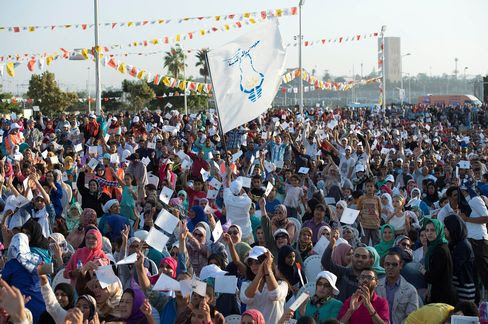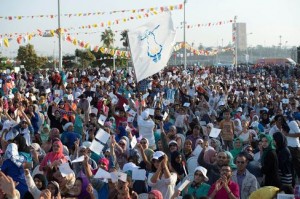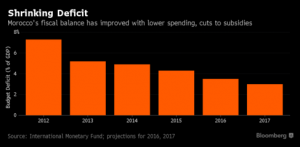Bloomberg
Caroline Alexander
caroaalex
Moderate Islamist party expected to win second term in power
King Mohammed remains pre-eminent force in nation’s politics.
Moroccans head to the polls on Friday to vote for a new parliament, the kingdom’s second legislative election since the Arab Spring, when as elsewhere across the Middle East protesters took to the streets demanding change.
Balloting will be a test of the political system ushered in by King Mohammed VI as anger roiled the region in 2011. The monarch was quick to introduce constitutional amendments that delegated some of his near-absolute powers to a prime minister. That helped Morocco avoid the violent unrest that swept other leaders from power, and embark on a path of economic reform. Here’s a look at the main contenders and possible outcomes.
Who’s Running for Power?
Prime Minister Abdelilah Benkirane’s Justice and Development Party, known by its French acronym PJD, came out on top in the 2011 elections, winning 107 seats of the 395-member lower chamber, known as the House of Representatives. His government was the first in Morocco to be led by a moderate Islamist movement. A more radical group, Al Adl wal-Ihassan, has been prevented from becoming a political party and has called for an election boycott.
Among some 30 political parties, the PJD’s main rival is the Authenticity and Modernity Party, founded less than nine years ago by the king’s classmate and current adviser, Fouad Ali el-Himma. Its secretary general, 49-year-old Ilyas el-Omari, has been campaigning under the slogan “Change Now.” The secular party came fourth in 2011, with 47 seats, but Driss Maghraoui, professor of political science at Al Akhawayn University in Ifrane, Morocco, says he expects it to gain more clout this time around.
A total of 60 seats are reserved for women, while 30 seats are earmarked for candidates under the age of 35. The multi-party system makes it impossible for any political party to win an absolute majority. The king remains Morocco’s pre-eminent political force.
Likely Outcome
Opinion polls are banned in Morocco so voting intentions are hard to forecast. In local elections last year, the PJD won most big cities, while El-Omari’s party did better in rural areas.
Michael Willis, who teaches Moroccan and Mediterranean Studies at St. Antony’s College, University of Oxford, said the most likely result is a PJD-led coalition including at least two other parties. Communists and liberals are represented in the current cabinet. El-Omari has ruled out collaborating with the ruling PJD.
As many as 15.7 million Moroccans are registered to cast ballots out of a population of about 34 million. Willis said he expects voter turnout to remain low at 35 to 40 percent, with many among the young and educated skipping voting. That would be less than the 45 percent of the electorate who cast votes in 2011.
The Economy
While militant attacks and political unrest roiled parts of North Africa and the Middle East from Turkey to Tunisia, Morocco has used its proximity to Europe and cheap labor to lure a growing band of investors that also includes aviation and car majors such as Bombardier Inc. and PSA Peugeot Citroen.
Foreign direct investment has risen more than 11 percent since 2010 to 39 billion dirhams ($4 billion) last year. By contrast, FDI to Egypt and Tunisia remains well below the pre-2011 levels, according to World Bank data. Even as agricultural output is expected to contract 9 percent this year hit by drought, and textile companies are under pressure from Chinese competition, the central bank expects non-farm growth to accelerate to 3.2 percent in 2017 from 2.8 percent this year.
To read more about Morocco’s economic progress, click here.
Over the last five years, Benkirane has tried to tackle graft, with limited results, and has introduced measures to rein in public spending. They include changes to state pension funds that include higher workers’ contributions and an increase in the retirement age to 63 by 2022, and cutting subsidies on energy products.
As a result, the fiscal deficit dropped to 4.3 percent of GDP last year from 7.3 percent in 2012, while low oil prices helped cut the account deficit. But unemployment remains high. The government says it stood at 8.6 percent in June, although the figure climbs to 21.5 percent among those under the age of 24.
Future Plans
If the PJD wins a second term, it says it will extend cuts to the subsidies system, and increase spending on infrastructure and education to help improve the economy.
El-Omari’s opposition have vowed to reverse some recent policies, including restarting government hiring and freezing the unpopular pension reforms.









